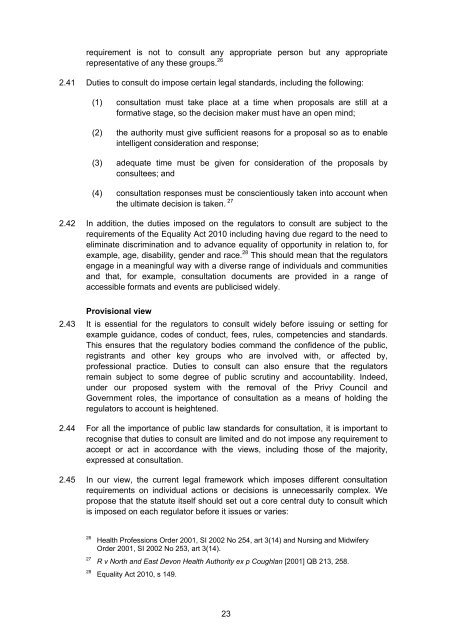Regulation of Health and Social Care Professionals Consultation
Regulation of Health and Social Care Professionals Consultation
Regulation of Health and Social Care Professionals Consultation
Create successful ePaper yourself
Turn your PDF publications into a flip-book with our unique Google optimized e-Paper software.
equirement is not to consult any appropriate person but any appropriate<br />
representative <strong>of</strong> any these groups. 26<br />
2.41 Duties to consult do impose certain legal st<strong>and</strong>ards, including the following:<br />
(1) consultation must take place at a time when proposals are still at a<br />
formative stage, so the decision maker must have an open mind;<br />
(2) the authority must give sufficient reasons for a proposal so as to enable<br />
intelligent consideration <strong>and</strong> response;<br />
(3) adequate time must be given for consideration <strong>of</strong> the proposals by<br />
consultees; <strong>and</strong><br />
(4) consultation responses must be conscientiously taken into account when<br />
the ultimate decision is taken. 27<br />
2.42 In addition, the duties imposed on the regulators to consult are subject to the<br />
requirements <strong>of</strong> the Equality Act 2010 including having due regard to the need to<br />
eliminate discrimination <strong>and</strong> to advance equality <strong>of</strong> opportunity in relation to, for<br />
example, age, disability, gender <strong>and</strong> race. 28 This should mean that the regulators<br />
engage in a meaningful way with a diverse range <strong>of</strong> individuals <strong>and</strong> communities<br />
<strong>and</strong> that, for example, consultation documents are provided in a range <strong>of</strong><br />
accessible formats <strong>and</strong> events are publicised widely.<br />
Provisional view<br />
2.43 It is essential for the regulators to consult widely before issuing or setting for<br />
example guidance, codes <strong>of</strong> conduct, fees, rules, competencies <strong>and</strong> st<strong>and</strong>ards.<br />
This ensures that the regulatory bodies comm<strong>and</strong> the confidence <strong>of</strong> the public,<br />
registrants <strong>and</strong> other key groups who are involved with, or affected by,<br />
pr<strong>of</strong>essional practice. Duties to consult can also ensure that the regulators<br />
remain subject to some degree <strong>of</strong> public scrutiny <strong>and</strong> accountability. Indeed,<br />
under our proposed system with the removal <strong>of</strong> the Privy Council <strong>and</strong><br />
Government roles, the importance <strong>of</strong> consultation as a means <strong>of</strong> holding the<br />
regulators to account is heightened.<br />
2.44 For all the importance <strong>of</strong> public law st<strong>and</strong>ards for consultation, it is important to<br />
recognise that duties to consult are limited <strong>and</strong> do not impose any requirement to<br />
accept or act in accordance with the views, including those <strong>of</strong> the majority,<br />
expressed at consultation.<br />
2.45 In our view, the current legal framework which imposes different consultation<br />
requirements on individual actions or decisions is unnecessarily complex. We<br />
propose that the statute itself should set out a core central duty to consult which<br />
is imposed on each regulator before it issues or varies:<br />
26 <strong>Health</strong> Pr<strong>of</strong>essions Order 2001, SI 2002 No 254, art 3(14) <strong>and</strong> Nursing <strong>and</strong> Midwifery<br />
Order 2001, SI 2002 No 253, art 3(14).<br />
27 R v North <strong>and</strong> East Devon <strong>Health</strong> Authority ex p Coughlan [2001] QB 213, 258.<br />
28 Equality Act 2010, s 149.<br />
23
















